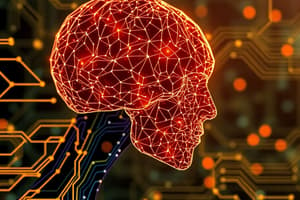Podcast
Questions and Answers
What is Narrow AI primarily designed for?
What is Narrow AI primarily designed for?
- Handling specific tasks like playing chess (correct)
- Learning from data without explicit programming
- Surpassing human intelligence in all aspects
- Performing any intellectual task like a human
Which of the following is a key feature of Deep Learning?
Which of the following is a key feature of Deep Learning?
- Using simple decision trees for data analysis
- Utilizing multiple layers of artificial neural networks (correct)
- Employing single-layer neural networks
- Learning from data with user-defined rules
What distinguishes General AI from Narrow AI?
What distinguishes General AI from Narrow AI?
- General AI is currently implemented in various applications
- General AI can only perform specific tasks
- General AI has the potential for human-level intelligence (correct)
- General AI uses basic machine learning techniques
Which application of AI is NOT correctly aligned with its usage?
Which application of AI is NOT correctly aligned with its usage?
In the realm of ethical considerations, what issue is often associated with AI?
In the realm of ethical considerations, what issue is often associated with AI?
Which subfield of AI involves agents that learn by receiving rewards or penalties?
Which subfield of AI involves agents that learn by receiving rewards or penalties?
What technology enables computers to comprehend and generate human language?
What technology enables computers to comprehend and generate human language?
Which of the following describes Super AI?
Which of the following describes Super AI?
Flashcards
Artificial Intelligence (AI)
Artificial Intelligence (AI)
Computer systems performing tasks that usually require human intelligence, like learning, problem-solving, or understanding language.
Machine Learning (ML)
Machine Learning (ML)
A way for AI to learn from data without explicit instructions.
Deep Learning (DL)
Deep Learning (DL)
A type of machine learning using complex networks to analyze data.
Natural Language Processing (NLP)
Natural Language Processing (NLP)
Signup and view all the flashcards
Narrow/Weak AI
Narrow/Weak AI
Signup and view all the flashcards
Computer Vision
Computer Vision
Signup and view all the flashcards
AI Bias
AI Bias
Signup and view all the flashcards
Robotics
Robotics
Signup and view all the flashcards
Study Notes
Definition of Artificial Intelligence
- Artificial intelligence (AI) encompasses computer systems able to perform tasks normally requiring human intelligence.
- These tasks include learning, problem-solving, decision-making, and understanding language.
- AI systems can be categorized based on their functionalities and learning approaches.
Types of Artificial Intelligence
- Narrow or Weak AI: Designed for specific tasks, like playing chess or recommending products. This is the most common type of AI presently deployed.
- General or Strong AI: Hypothetical AI that possesses human-level intelligence and can perform any intellectual task a human can. This is a theoretical goal of AI research.
- Super AI: Hypothetical AI exceeding human intelligence in all aspects. This remains firmly in the realm of science fiction.
Key Concepts in AI
- Machine Learning (ML): A subset of AI where algorithms learn from data without explicit programming.
- Deep Learning (DL): A specialized type of ML using artificial neural networks with multiple layers to analyze complex data.
- Natural Language Processing (NLP): Enables computers to understand, interpret, and generate human language.
- Computer Vision: Enables computers to interpret and understand images.
- Robotics: Combines AI with physical robots to allow them to interact with the real world.
AI Subfields
- Expert systems: Mimicking the decision-making of human experts in specific domains.
- Natural language understanding: Enables computers to comprehend and react to human language.
- Machine vision: Enables computers to perceive and interpret visual information.
- Robotics: Combines AI techniques with physical robots for practical application.
- Reinforcement learning: AI agents learn by trial and error, receiving rewards for desirable actions and penalties for undesirable actions.
AI Applications
- Healthcare: Diagnosing diseases, personalizing treatment plans, drug discovery.
- Finance: Fraud detection, risk assessment, algorithmic trading.
- Transportation: Self-driving cars, traffic optimization.
- Customer service: Chatbots for customer support, personalized recommendations.
- Manufacturing: Automation of tasks, predictive maintenance.
Ethical Considerations in AI
- Bias: AI systems can inherit and amplify biases present in the data they are trained on.
- Privacy: Collection and use of personal data by AI systems can raise ethical concerns.
- Accountability: Determining responsibility when AI systems make errors or cause harm.
- Transparency: Understanding how AI systems arrive at their decisions is crucial.
- Job displacement: Automation capabilities of AI may lead to job displacement in certain industries.
Future of AI
- Continued development and refinement of existing AI techniques.
- Emergence of new AI paradigms and applications.
- Increasing integration of AI into various aspects of daily life.
- Potential for transformative impacts on various sectors and society as a whole.
- Ongoing research and development to address ethical challenges. This will ensure the responsible use of these powerful technologies.
Studying That Suits You
Use AI to generate personalized quizzes and flashcards to suit your learning preferences.
Description
Explore the definition and types of artificial intelligence in this quiz. Learn about the distinctions between narrow AI, general AI, and super AI, as well as key concepts like machine learning and deep learning. Test your understanding of AI technologies and their functionalities.




